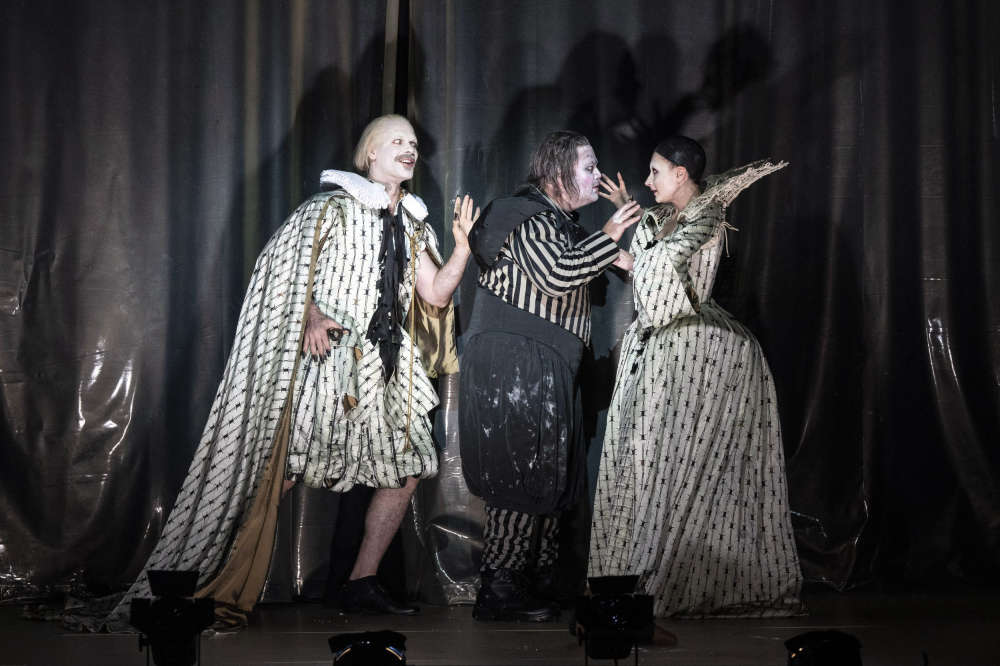When I spoke to Paul Carey Jones ahead of WNO’s Rigoletto coming to the Mayflower Theatre he told me that the opera opens with an orgy. And he wasn’t wrong. The opening was hypnotically repulsive, with people being un-ceremonially noshed off underneath huge – and beautiful – Georgian dresses. It was off-putting, yet impossible not to watch, almost liberating in its sheer gross-ness. It set me thinking – what is this show about?
It’s about Rigoletto, obviously. As far as plots go, Rigoletto is not a laugh-a-minute opera, but WNO’s cast managed to transform the really-quite-bleak story into a rich production with a lot of real humour and depth. The quality of the acting required to get any laughs out of an opera largely about death, submission, and kidnap cannot be under-praised.
Was it about repulsiveness? About giving in to impulse? I was excited for the interval only because it offered the first opportunity to talk about it.
In the end, I think that what this production centred on was folly. Yes, the opera is funadementally about the ridicule of the foolish and how it is foolish to believe that those who commit crimes against others will receive suitable retribution, but WNO had woven this theme of folly into the visual makeup of the show from the very beginning.
Before the opera began, I thought how beautiful the lightly gleaming sliver curtains were. They looked elegant and ethereal. Then, as they opened, I realised that they were actually a kind of grubby see-through plastic. The kind you find hung in thick strips in butchers shops to separate the areas where carcasses are hung from the public. Even the set was abbatoir-esque. No matter how beautiful the costumes were or the makeup, they were inevitably torn off and thrown to the floor and smudged. No matter how clean and orderly the set seems, with its white grids and minimalism, it will be stained with blood in the end. The curtain isn’t a silk cascade it’s a PVC wall. There was something wonderfully unsettling about the clash between the clinical purity of the set and the sense of grime that soaked everything from the curtain to the lustful, revenge-obsessed, and ego-driven characters. Status in the world did not protect these characters from injury, and immorality did not dictate who would be punished: it was all folly.
This production was outstanding, with breathtakingly beautiful moments in its lighting (and a fantastic lighting rig with footlights that highlighted the idea that all of these characters are ultimately taking part in a futile parade of vanity), incredible singers and actors, and a brilliantly assured visual identity. It’s only problems are the problems that all operas have: they’re a bit long because the characters say the same things over and over again. There’s nothing (reasonably) to be done about that. (My hope is that opera companies begin touring abridged versions of operas, like when you’re at church and they tell you you’re only singing verse one and four of a hymn, but I suspect this won’t ever happen).
What was most moving, though, was at bows when the cast emerged in their Protect Welsh National Opera t-shirts and holding their Equity banner. The Musicians Union representatives and members of cast greeted audience members in the queue on the way in to the Mayflower Theatre at the start of the night to tell us about the catastrophic cuts the WNO are facing, handing out leaflets with QR codes to sign their petition. The orchestra's decision to wear these t-shirts, too, served as an ever-present reminder that without funding, this sort of thought-provoking, music-that-hits-you-somewhere-deep-in-your-core, enlightening entertainment simply won’t exist anymore. And that threat is more real than ever.
People say that opera is inaccessible, and only enjoyed by an older, wealthier audience. How can opera companies address this if they have been forced into closure by government cuts? Tonight’s production was evidence – if any was needed – that world-class companies like WNO should be the pride of Britain, not seen as frivolity that we can turn our backs on when the purse-strings are tight. Far from irrelevant, opera companies like the WNO are vital for carrying on the lives of our most treasured stories, scores, and theatrical traditions.
Verity Babbs is the host of Voice FM's 'Arts & Culture Show' on Wednesdays at 2PM
www.veritybabbs.com
Instagram






